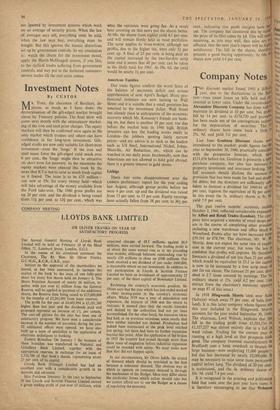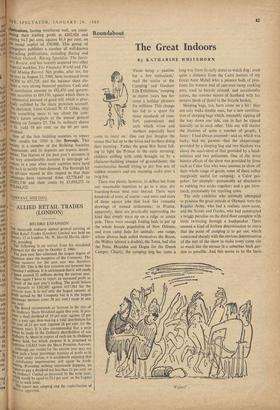Company Notes
rr HE discount market found 1960 a difficnIS, I year, due to the fluctuations in the Bilo rate—rises cause losses on bills held and dis. counted at lower rates. Under the circumstances Alexanders Discount Company has done well t° maintain its dividend at 10 per cent. Net profits fell by 14 per cent. to £174,720 and provision, has been made out of the contingencies account' for the depreciation of securities. The 11 ordinary shares have come back a little to 35s. 9d. and yield 5.6 per cent.
Last June Goulston Discount shares were introduced to the market; profit figures for the, year to September 30, 1960, practically coincided with the prospectus forecast, which were £131,656 before tax. Goulston is primarily a hire' purchase company, but also has interests to property investment and insurance broking. The full accounts should disclose the amount of provision that has been made for bad and doubt' ful debts; but the directors are sufficiently coot,: fident to forecast a dividend for 1960-61 of 1° per cent. (against the equivalent of 81 per cent.) In this event the 5s. ordinary shares at 8s. 6d. yield 5.9 per cent.
The past twelve months' accounts, ending October 2, 1960, reflected considerable expansion by Allied and Retail Trades (London). The cony pany have acquired a number of retail shops and are in the course of completing other premises including a new warehouse and office block at Woodford. Profits after tax have increased fronv £59,561 to £78,799. The chairman, Mr. W. 11.1 Martin, does not expect the same rate of expo' sion in the current year, but none the less is confident that profits will improve. He therefore forecasts a dividend of not less than 21 per cent', which would be equivalent to 23.1 as the capital is now to be increased by a free scrip issue of one for ten shares. The forecast 21 per cent. divi- dend is 2.7 times covered by earnings. The 5s. ordinary shares at 25s. yield 4.2 per cent. (An extract from the chairman's statement appears on page 87 of this issue.) In 1958 Illingworth Morris took over Salts (Saltaire) which owns 75 per cent. of Salts (Ire' land). It is this latter company whose figures are this year included in the Illingworth Morris accounts for the year ended September 30, 1960. The chairman, Lord Wilmot, explains that the fall in the trading profit from £1,504,734 to £1,327,237 was almost entirely due to a fall in wool values. Trading for the current year is running at a high level so that prospects look good. The company (worsted manufacturers in Bradford) uses a bank overdraft to finance its large business—now employing 11,000 people— but this has increased by nearly £2,000,000. It may be necessary to raise some more permanent capital before long. The dividend of 20 per cent. is maintained, and the 4s. ordinary shares at 10s. 9d. yield 7.4 per cent.
It is recognised in the printing and publishing field that costs over the past year have risen; it is therefore encouraging to see that Websters ihiblications, having weathered well, are main- taining their trading profit at £102,926 and 'earning 94.7 per cent. against 81.4 per cent. on IN issued capital of £90,000. This group of newspapers publishes a number of well-known lest-selling publications, including Racing and 00thall Outlook, Racing Specialist. The Inves- ,,l'r's Review, and has recently acquired two other nnancial weeklies, The Financial World and The Gold Mining Record. Net profits, after tax, for the Year to August 31, 1960, have increased from 4;14398 to £51,728, and the balance sheet dis- closes a very strong financial position. Cash and `ax certificates amount to £82,470 and govern- 'nem securities to £69,350, against which there is 4 substantial amount of good will which is prac- tically nullified by the share premium account. Lille chairman, Lieut.-Colonel W. 0. Gibbs, may have something more to say about the com- PanY's future prospects at the annual general fleeting on January 23. The Is. ordinary shares at 6s. yield 10 per cent. on the 60 per cent. dividend.
One of the first building societies to report their results for 1960 is the Borough. This 10eiety is a member of the Building Societies kasociation; and its deposits are trustee invest- ments. The feature of the past year's accounts is the very considerable increase in mortgage ad- 'vanees in a year when most societies were hard Put to it to satisfy their demand. The Borough hit In all-time record in this respect in that their ,advances have increased from £2,778,447 to 12,051,750 and their assets by £1,050,252 to '9,964 932.



































 Previous page
Previous page